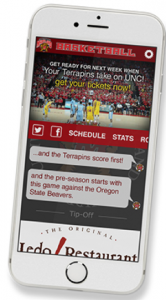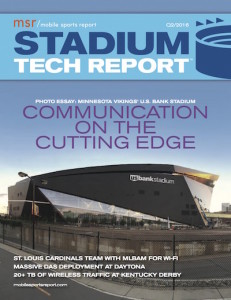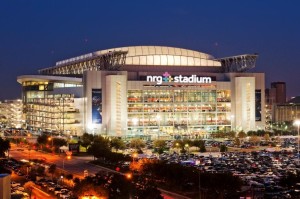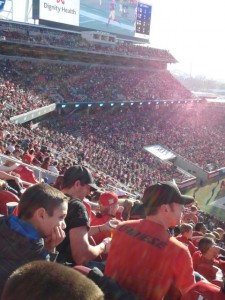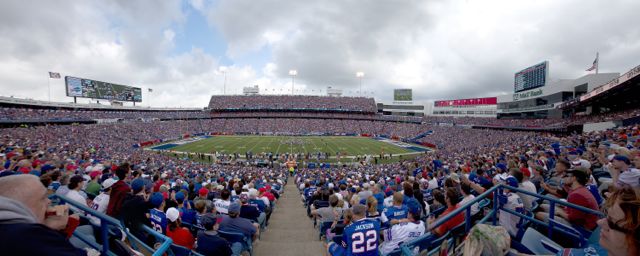
Ralph Wilson Stadium in Buffalo. Credit: AP Photo/Scott Boehm
“Our own internal staff and the people we bring in — fire, emergency medical services, those groups — were having some real challenges communicating among themselves,” Wheat said. “The key for us was seeing the communications challenges throughout the stadium on game day.”
So a year later when the Buffalo Bills began examining their Wi-Fi infrastructure, they knew they wanted a system that gave fans lots of options – content where and when they wanted it, whether to access social media, the dedicated team app, email or simple web browsing, Wheat said.
“We watched a lot of our [NFL] peers installing Wi-Fi in their stadiums for the last 5 years and saw the investments that different clubs were making,” said Wheat, who added that the extra time gave the Bills the chance to watch the technology develop and evolve and become “more mainstream and reliable.”
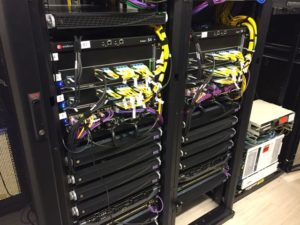
The Wi-Fi backend consists of two ExtremeSwitching bonded S4 Chassis; yellow wires are single-mode fiber optic patch cables and the purple cables are for Wi-Fi infrastructure. Credit: Buffalo Bills / Extreme
“We saw Gillette Stadium in Foxborough and used that to determine what we wanted and who we wanted to work with,” Wheat said. The Bills recognized the increasing demand for mobile connectivity, with some fans even attending with multiple capable devices. The Wi-Fi network needed to deliver services to these devices anywhere in the 70,000 seat capacity stadium.
The Bills looked at four different Wi-Fi vendors, narrowed it down to two, then chose Extreme Networks for its Wi-Fi and wired networks. “We worked pretty extensively with Extreme — their expertise in this space helped us understand our design better and plan for tremendous growth to cater to our fans,” Wheat said. They also worked with technology integrator Carousel Industries for its managed services expertise, especially at sports facilities.
Cutting through the concrete
Editor’s note: This profile is from our most recent STADIUM TECH REPORT, the Q2 issue which contains a feature story on Wi-Fi analytics, and a sneak peek of the Minnesota Vikings’ new US Bank Stadium. DOWNLOAD YOUR FREE COPY today!
As with any venue as old as Ralph Wilson Stadium (built in 1973), there were some technical challenges to work through before installing the Wi-Fi. The stadium has an extremely limited overhang from the upper decks; there are also a limited number of railings from which to hang equipment, or conceal it. Individual sections in the bowl also tend to be wide and long, according to Wheat.
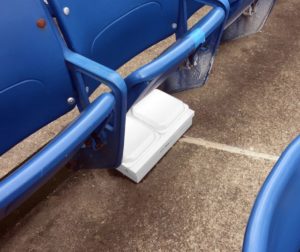
Under-seat Wi-Fi AP at Ralph WIlson Stadium
Installing 211 under-seat APs in the lower bowl was also the most labor-intensive part of the Wi-Fi upgrade. Seats had to be removed, then concrete was saw-cut to different depths, depending on the number of cables and APs to accommodate. There was more than 5,000 feet of concrete cuts when all was done, which took nearly six weeks –- “a big challenge,” Wheat said.
In other parts of the stadium, the Bills relied on flag poles and overhangs for AP installation; the public Wi-Fi at Ralph Wilson Stadium ended up with 850 APs total, with 211 under-seat APs in the lower bowl. Total cost: About $4 million, according to Wheat.
Social media and internal operations
Fans are required to authenticate with Social Sign In to access Bills’ Wi-Fi on game day. The service allows users to sign in with Facebook or by providing their email address.
“As the network remembers you, we can deliver more personalized content and learn customer likes and dislikes,” Wheat said, adding that they’re still testing different ways to measure customer behavior. “The challenge for us as an entertainment provider is we have 70,000 people who will come see our game live,” he said. “And we only know the names of 14,000 people who purchased those tickets, and that often changes between the original buyer and the actual attendee.”
As the Bills learn more, their intention is to serve up content that’s more and more personalized. For the moment, the online activities of Bills fans mirrors what happens at other NFL stadiums around the league, according to John Brams, director of sports and entertainment for Extreme. Roughly 60 percent is social media usage -– Facebook, Instagram and Snapchat; iPhones hitting iCloud, either to update apps or upload photos, also constitute a significant amount of data usage. A third tier of fans is using apps for fantasy sports or individual NFL teams, Brams added.
So far, the Bills have clocked game-day totals of 24,334 unique users on the network, with a peak concurrent usage rate of 20,067 fans. Peak game-day data volume topped out at 3.4 TB, according to figures from the team.
Internally, the Bills use wireless for ticketing and entry scanning, including secondary scanning at entrances to premium areas; a Bills retailer uses the Wi-Fi for some of its pop-up shops around the stadium. “Our guest services ambassadors have mini tablets to assist customers with questions or if they need to do incident logging or tracking,” Wheat said.
There’s no in-seat ordering via Wi-Fi at Ralph Wilson Stadium, but technology isn’t the issue. “Infrastructure in the back of house is the impediment to that,” Wheat laughed. The Bills also use the Wi-Fi in its fieldhouse practice facility across the parking lot from the stadium, but not in the parking lots themselves.
The Bills will continue to work on giving fans that personalized experience. “If you’ve never been to a game before and are parking a mile away in a satellite lot, we want to give you GPS directions to get you from your car to the gate to your seat,” Wheat said. “We want to be able to tell you where the shorter lines at the concession stands are, using the technology to make the customer experience better.”
Wheat and his group are also in the process of looking at and installing Bluetooth-based beacon technology for the upcoming season. They’re also reworking the Bills’ mobile app for game-day use, adding wayfinding and other features.
“We want fans to experience Buffalo Bills football the way they want to,” Wheat said.
